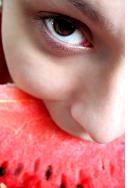|
Daily dietArticle submission, Thursday 26th June 2008
What is the best daily diet was asked recently to me and I said its non generic, takes care of your pocket, taste and health. Catherine Zeta Jones, massages caviar in her hair, while few of us get opportunity to even see caviers, I’ve heard people bathing with Evian water, while in some countries there hardly any water to drink. So what you eat largely depends on what you can afford.
Always eat food which are available during the season or grown regionally, they are reasonably priced and are often good for health, nature has its unique way of availability, strawberries can cure cough and phlegm and hence found more in colder parts of world while mangoes protects from heat stroke and found in warmer climate. After affordability and availability comes genetics, your genes play very important role in the diet that will suit you, the influence of diet on health depends a lot on an individual's genetic makeup.
Biologically, when we eat a meal. Until recently, scientists thought food had basically one job: it was metabolised to provide energy for the cell. Indeed, that is what happens to most dietary chemicals - but not all. Some don't get metabolised at all; instead, the moment they're ingested, they become ligands - molecules that bind to proteins involved in "turning on" certain genes. A diet that's particularly out of balance, scientists say, will cause gene expressions that nudge us toward chronic illness unless a precisely-tailored "intelligent diet" is employed to restore the equilibrium.
Genestein, a chemical in soy which attaches to oestrogen receptors and regulates genes. Individuals may have oestrogen receptors that react to genestein differently, helping to explain why two people eating the same diet can respond very differently - one maintaining weight, for example, and the other ballooning.
You can always try various cuisines but genetically you will be more comfortable with what ever your staple food has been for generations.
Migration of people to different parts of the world and exposure to various cultures has resulted in food exchange too, this exchange is good to experiment sometimes but your genes have fixed set of preprogrammed instructions. Don’t try to change this programme drastically.

Key points would be:
Above information is given in good faith however for any diseased condition please consult physician or dietician before starting it. Your questions and suggestions are welcome at: smartediets@gmail.com Back to Healthy Living 

|




